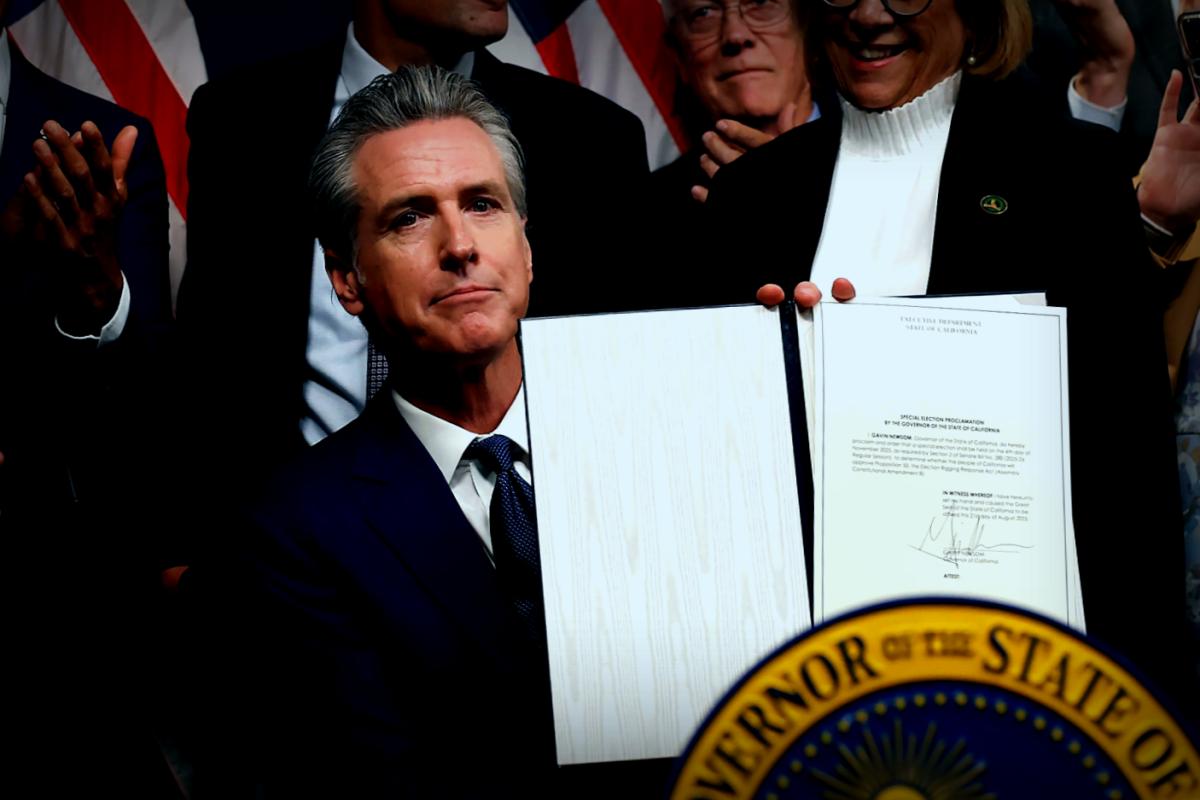On Thursday, California’s Governor Gavin Newsom took a significant step by signing off on a contentious congressional redistricting plan. This move comes as state Democrats aim to counter a redistricting effort backed by Trump, which could bolster the GOP’s foothold in Congress.
The newly proposed map, pending voter approval, is expected to change five Republican-held U.S. House seats, making them more favorable for the Democrats by the upcoming 2026 midterm elections.
The legislation received swift approval from the Democratic-controlled Assembly and Senate before Newsom’s signature. The plan is set to appear on the ballot on November 4, leaving voters the final say in a process that could entail a costly and unpredictable election.
Democrats in California argued that revising the congressional maps was essential following President Trump’s intervention in Texas, where he urged Republican leaders to restructure districts to maintain their slim majority in the House. Newsom stated that this redistricting effort was vital to counterbalance what happened in Texas.
During the signing event, Newsom commented, “Texas fired the first shot. We wouldn’t find ourselves in this position if it weren’t for Texas. We are neutralizing their actions and ensuring Americans receive fair representation.”
California’s Response to Texas’ Moves
The Texas House, led by Republicans, approved new congressional maps recently after Democrats resorted to leaving the state to stall the process. The Texas Senate is anticipated to pass the measure as well.
After the bill passed in Texas, Newsom took to social media, declaring, “It’s on!” He pledged to redraw California’s congressional boundaries in response to the Lone Star state’s actions.
Gavin Newsom, seen as a potential presidential candidate in 2028, remarked sarcastically towards Texas’s GOP Governor Greg Abbott about his allegiance to Trump, calling him a “loyal lapdog” who has compromised the fundamental principles of democracy.
Trump praised Texas Republicans for advancing the redistricting plan, promoting it on social media as a win, which will supposedly secure more congressional seats as well as citizens’ rights.
This mid-decade redistricting is relatively rare and has noteworthy implications for national politics. With Republicans holding a tight majority currently, losing just three seats to Democrats during the midterms could shift the control of the House, which highlights the significance of redistricting in both Texas and California.
Moreover, Trump has been pushing similar initiatives in Indiana and Florida, while reports indicate that Democrats in New York are considering their own delineation endeavors. Republican-led Missouri is also contemplating changes in their districts, not to mention fresh lines anticipated in Ohio due to state laws affecting party representation.
Former President Barack Obama, usually critical of partisan gerrymandering, spoke in favor of Newsom’s initiative, labeling it a “smart, measured approach” during a fundraiser.
Recent discussions saw Newsom urging Democratic leaders for backing on the redistricting plan, frame it as a chance to reclaim control of political representation in the state.
The draft congressional map revealed by California Democrats would notably reshape five current Republican-held districts and tweak others to better serve Democratic candidates. While alterations are on the table, there’s no certainty that the Democrats will secure victories in all repositioned districts.
Republican Opposition to Redistricting Efforts
Even with a dominant Democratic hold in California’s legislature, challenges remain ahead, as state Republicans vigorously oppose the redistricting plan. Unlike Texas, California operates under an independent redistricting commission set by voters, requiring significant legislative support and public validation to modify the congressional landscape.
On Wednesday, California’s supreme court dismissed a GOP’s effort to block the mid-cycle redistricting process, upholding that Republicans failed to prove sufficient grounds for legal relief.
California Senate Minority Leader Brian Jones criticized the entire procedure, arguing that it was unlawful and contradicts the state’s constitutional amendment set forth to take redistricting decisions out of political hands.
“The voters have clearly voiced their preference for an independent commission, not bureaucratic maneuvering by partisan interests,” remarked Jones.
The rapidity of the redistricting process drew concerns about transparency and costs surrounding the upcoming special election; according to Democratic Assemblyman Isaac G. Bryan, the expense of democracy is indispensable in this context.
Despite furor over this initiative, Democratic leaders, alongside Newsom, continue to assert that the independent commission will remain and this action is a necessary response to the challenges posed by Trump’s influence and Texas’s countermeasures.
This perspective, however, finds no sympathy from Jones, who contended, “Two wrongs don’t make a right, hence this effort is unwarranted and unjustifiable.”



















